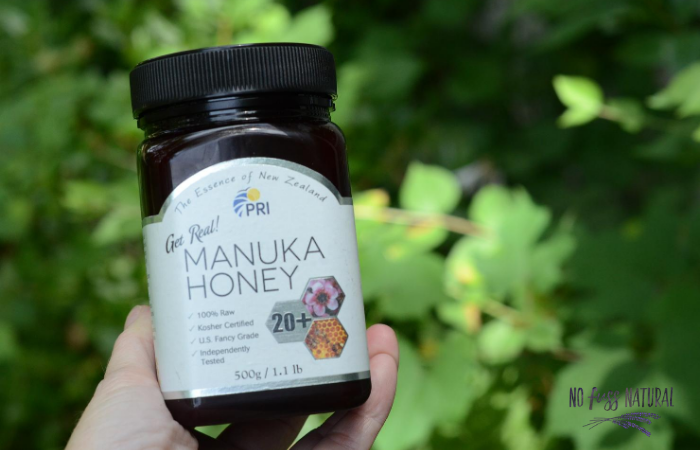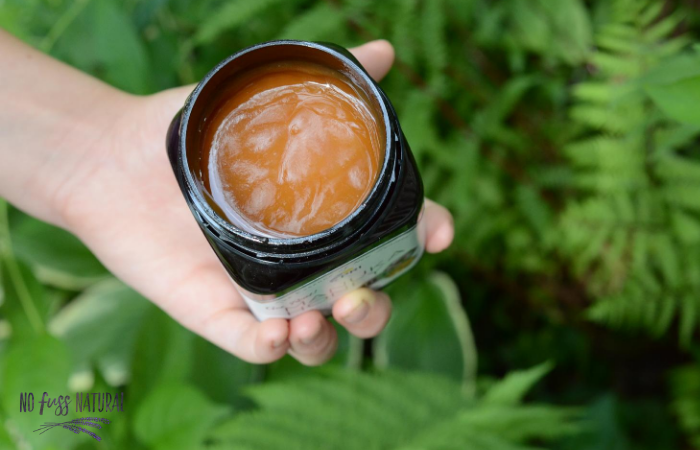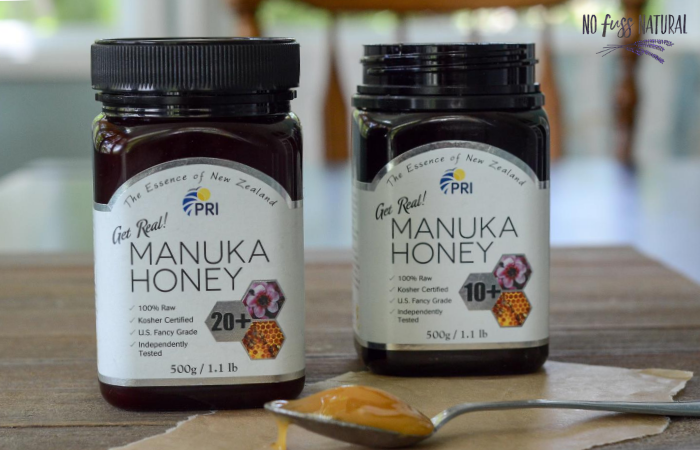For those with seasonal allergies, many an outing has been dampened by a sore throat, itchy, watery eyes, and runny nose that accompanies time spent outdoors. There’s not doubt about it, allergies can make life miserable!

If you suffer from seasonal allergies, you’ve likely searched high and low for relief.
One of the natural remedies touted to cure allergies is raw, local honey. The premise is that by eating local honey one will also consume local pollen and build up a tolerance for it, which will result in fewer allergy symptoms over time.
However, there is very little scientific evidence to support this claim.
In fact, a number of studies show that local honey does not significantly help allergies. It most certainly doesn’t cure them.
I know this is going against the grain a little, but if we are going to find ways to support ourselves through allergy season, we need to find what works!
One reason local honey does not work is that the pollen found in local honey is not the same pollen that aggravates most people’s allergies. According to allergist Neeta Ogden, MD, the “pollen from weeds, trees, and grasses is the leading cause of seasonal allergies.” These allergens are mostly wind-blown pollen, which means they don’t flower, thus the bees don’t usually make honey from them. (Bees generally pick up pollen from brightly colored flowers.) (Source)
Another important fact is that honey doesn’t actually contain much pollen, which further lessens the possibility of it actually curing allergies as mentioned above. Honey is made from nectar, not pollen. Any pollen found in honey is somewhat accidental as bees collect the pollen to feed to their babies, not to make honey.
An article from the American College of Allergy, Asthma, and Immunology further explains that “One study, published in 2002 in the Annals of Allergy, Asthma & Immunology, showed no difference among allergy sufferers who ate local honey, commercially processed honey, or a honey-flavored placebo.”
As you can see, there is much evidence which dispels the myth that honey cures allergies.
All that said, there is one honey that is beneficial to keep on hand for allergy support, even though it does not cure allergies: Manuka honey.
Why use Manuka Honey for Allergy Support?

First of all, it’s important to note that Manuka honey does not cure allergies. So, why would you want to use it?
The main reason: non-peroxide activity.
As we discussed in our post, What is Manuka Honey?, non-peroxide activity is what makes Manuka honey special. Manuka honey has additional non-peroxide activity (NPA) not found in local honey. This comes from an organic compound called methylglyoxal (MGO) and two others, dihydroxyacetone (DHA) and 5-hydroxymethylfurfural (HMF). This compound is the “active” component of Manuka honey and is not deactivated by the human body.
No other honey has such high levels of methylglyoxal. This makes Manuka honey the most active and beneficial honey available today.
The fact that this component is not deactivated by the human body means it is available for use, which further means we get to reap the benefits!
Because of this non-peroxide activity, Manuka can better help reduce the symptoms of allergies, such as a sore throat, inflammation, and so on.
As Registered Dietician, Tracy Lockwood-Beckerman explained this to the editorial team at Well + Good, “The active ingredient, MGL* methylglyoxal, has been shown to be effective for treatments against nasal mucus—which is [one of the symptoms] you experience when you have allergies,” she says. “The direct relationship isn’t pegged to allergies, but manuka honey’s active ingredient can be an effective treatment for nasal mucus regardless of its source, whether it’s a cold, flu, allergies, or respiratory infection.”
In general, Manuka is better for all medicinal purposes than local honey.
That said, local honey does have a place!
Local honey is great for baking, sweetening tea, and general food consumption.
When you really need a medicinal powerhouse, manuka is the way to go.
How to Use Manuka Honey for Allergy Support
For best results, consume Manuka honey regularly throughout allergy season. I personally take a small spoonful every morning as part of my wellness routine as it is useful for many things besides allergies.
You may also like to stir it into a Nettle infusion and drink as a cold herbal tea.
Include in energy balls for natural sweetness and wellness support.
Where to Find the Best Manuka Honey

When shopping for manuka honey it is important to look for a transparent and trustworthy company. Not all manuka honey is created equal and you need to know exactly what you are getting and where it comes from.
I use Manuka honey from Pacific Resources International (known as PRI). Not only have I found their honey to be extremely delicious, the company itself is incredible.
PRI provides a full Certificate of Analysis (COA) showing the DHA, MG and UMF levels for every jar of honey they carry. Simply send the batch number (find it on the label) and they will provide the Certificate of Analysis for that specific batch of honey.
PRI sells UMF Manuka honey as well as independently tested Manuka honey. Their honey is the best I’ve ever tried.
I love that PRI honey is sourced and packed by family-owned beekeepers and is compliant with Manuka Honey standards set by the New Zealand Ministry for Primary Industries. I feel confident eating, giving it to my kids, and recommending it to you!
Click here to visit Pacific Resources International and add some high-quality Manuka honey to your allergy support arsenal.
*Usually referred to as MGO


 Fruit Salsa
Fruit Salsa
Leave a Reply